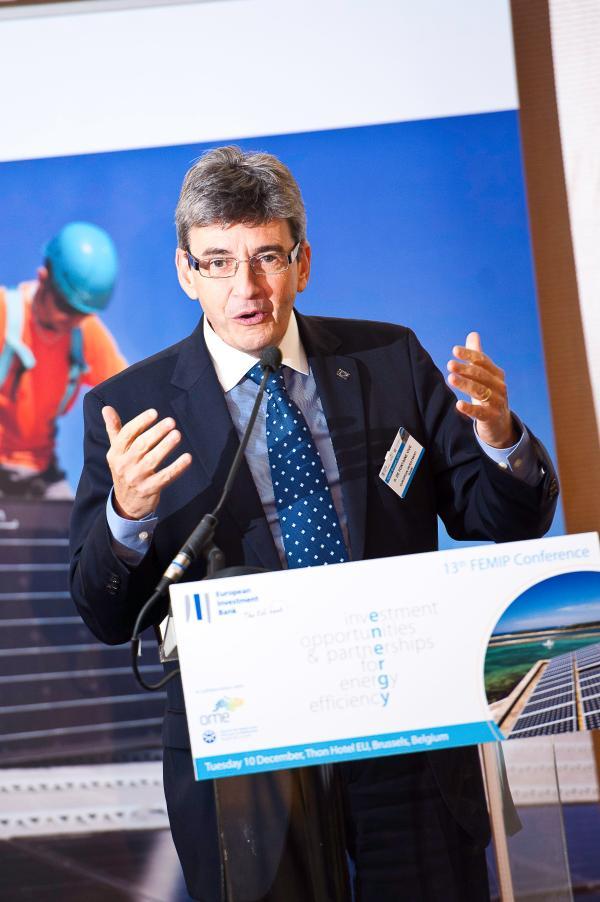
On 10 December 2013 in Brussels, the European Investment Bank (EIB) hosted the 13th FEMIP Conference in partnership with the Union for the Mediterranean (UfM) and the Observatoire Méditerranéen de l’Energie (OME). The focus of the meeting was to promote energy efficiency in the Mediterranean partner countries of the European Union. The conference brought together some 250 participants: the Energy Ministers of Morocco, Tunisia, Palestine and Turkey, business representatives, experts and practitioners of the sector, supervisory and regulatory authorities, financial institutions, academics and representatives of civil society.[1]
The energy sector represents a key challenge for the region’s sustainable development and the continued growth of Arab countries in transition to democracy. FEMIP has also dedicated nearly 40% of its financing (EUR 5.4 billion) to upgrading this sector, particularly by promoting renewable energy under the Mediterranean Solar Plan. However, the characteristics of the energy system in the countries concerned are making the current situation less and less sustainable: exponential growth in demand (on average 8% a year); very high dependence on hydrocarbons for power generation; inadequate production and distribution infrastructure, leaving many private households and businesses without a secure energy supply; extensive use of a subsidies system, which weakens countries’ public accounts, jeopardises the viability of new investments and makes it difficult to raise users’ awareness of the need for energy savings.
In such circumstances, promoting energy efficiency is one of the most effective and least costly responses to the need to increase the availability of energy and streamline its use. According to a study conducted with the backing of the FEMIP Trust Fund, the potential for energy savings is 80% in buildings, 60% in industrial processes and between 20% and 40% in terms of consumption by private households. Whilst the potential for savings is therefore very real, the shift to energy transition remains compromised by market fragmentation, a capacity deficit affecting the authorities and the financial system and by the system of subsidies, which are not designed to stimulate energy modernisation.
The exchanges over the course of the day served to establish the following action areas:
- The political and technical authorities and operators recognise collectively the need to promote energy efficiency. Many initiatives have already been launched with tangible results, e.g. in Morocco, Tunisia, Lebanon and Palestine. At the same time, a number of countries have started to gradually convert energy subsidy systems into systems involving incentives for modernisation.
- The Ministers expressed their determination to build on these developments and, in particular, to make energy efficiency a priority with quantified targets and action plans. It should, however, be noted that such a policy must remain compatible with maintaining the international competitiveness of the economies concerned and take account of specific local characteristics, which is one of the keys to its success;
- Energy transition is a societal process, whose achievement is greatly facilitated by the creation of public agencies that can concentrate and share expertise, the overhaul of the regulatory framework and tariff system, the upgrading of local banking and financial facilities and the development of financial tools and regional cooperation. Accordingly, the international community’s backing must cover financial instruments, the transfer of know-how and the introduction of technical assistance in support of the partner countries.
As the main sponsor of the economic and social development of the EU’s Mediterranean partner countries, EIB-FEMIP considers its role in support of this transition to have three objectives: (a) technical assistance with respect to horizontal aspects or regional cooperation; (b) assistance with the identification and technical definition of investment projects; and (c) the introduction of diversified financing facilities which, through the combined use of budget resources and loans, can assume part of the risk and thus serve as a catalyst for private savings.
Building on the experience that it has gained over the past 20 years in Europe, the EIB has already started to make available new instruments in the southern Mediterranean:
- the regional programme to prepare energy efficiency or renewable energy projects under the Mediterranean Solar Plan, which was allocated EUR 5 million by the NIF[2] to speed up the preparation of around 20 regional projects;
- a EUR 50 million loan in support of Lebanese SMEs investing in renewable energy or energy efficiency. This loan, intermediated by the Lebanese banking sector, will receive EUR 4 million of NIF-funded technical assistance;
At the same time, the EIB is considering the possibility of extending to the southern Mediterranean the technical assistance facilities for sustainable investment programmes promoted by local authorities, using the ELENA[3] programme as its model.
EIB-FEMIP will present the conclusions of this FEMIP conference at the UfM ministerial meeting on energy (Brussels, 11 December 2013) and at the next FEMIP ministerial meeting (Athens, 1-2 April 2014), which will be dedicated to the strategic guidelines for Euro-Mediterranean financial cooperation within the framework of the new budget for 2014-2020.
[1] Programme and documents available on the EIB website: http://www.eib.org/infocentre/events/all/13th-femip-conference-brussels.htm
[3] ELENA: European Local Energy Assistance; see: http://www.eib.org/products/elena/index.htm

Photographer: EIB ©To be defined
Download original

Photographer: EIB ©To be defined
Download original

Photographer: EIB ©To be defined
Download original

Photographer: EIB ©To be defined
Download original

Photographer: EIB ©To be defined
Download original

Photographer: EIB ©To be defined
Download original

Photographer: EIB ©To be defined
Download original

Photographer: EIB ©To be defined
Download original

Photographer: EIB ©To be defined
Download original

Photographer: EIB ©To be defined
Download original

Photographer: EIB ©To be defined
Download original